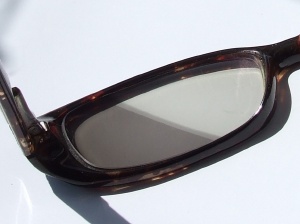Apr 22 2009
Researchers in Japan are reporting development of a new so-called "photochromic" material that changes color thousands of times faster than conventional materials when exposed to light. The development could lead to a wide range of new products including improved sunglasses, more powerful computers, dynamic holograms, and better medicines, the researchers say. Their report appears in the Journal of the American Chemical Society, a weekly publication.
 Scientists have developed a material, which quickly changes color when
exposed to light, that could be used in various applications, from optical data storage in computers to improved sunglasses. Credit: Wikipedia Commons
Scientists have developed a material, which quickly changes color when
exposed to light, that could be used in various applications, from optical data storage in computers to improved sunglasses. Credit: Wikipedia Commons
In the new study, Jiro Abe and colleagues note that photochromic materials are most familiar as the invisible layers found in the lenses of many high-end sunglasses, which change color when exposed to sunlight. For years, researchers have explored the possibility of using these unusual materials for optical data storage in computers and as “molecular switches” for more controlled drug delivery. Conventional photochromic materials, however, tend to be relatively slow-acting (tens of seconds to hours) and unstable, which prevents their use for many advanced applications, the scientists say.
The scientists describe development of a unique photochromic material that shows instantaneous coloration upon exposure to ultraviolet light and its disappearance within tens of milliseconds when the light is turned off. The decoloration speed is thousands of times faster than conventional materials. The material is also more stable and longer-lasting, they note. In laboratory studies, the scientists showed that the new material could instantly change from colorless to blue in both solid form and in solution when they exposed the molecules to ultraviolet light, and quickly back to colorless when the light is turned off. The development opens the door to futuristic technologies “with unprecedented switching speeds and remarkable stabilities,” the article notes.